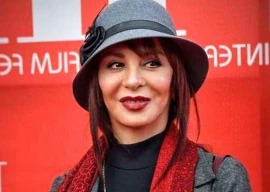
Authorities in Iran have begun legal proceedings against a prominent pop singer over his latest song urging women to take off their mandatory headscarves, the judiciary said on Sunday.
The action against Mehdi Yarrahi comes almost a year after the death in custody of Iranian Kurd Mahsa Amini, 22, triggered months of protests around the country.
Amini had been arrested for alleged breach of the Islamic republic's strict dress code requiring that a woman's head and neck be covered.
Yarrahi, 41, on Friday released a song called "Roosarito", which means "Your Headscarf" in Farsi, expressing support for last year's protest movement.
"A legal case was filed against Mehdi Yarrahi following the release of an illegal song which defies the morals and customs of the Islamic society," the judiciary's Mizan Online website said.
It was not immediately clear what the formal charges were. Yarrahi was not in custody.
Yarrahi's three-minute video clip incorporated the protest movement's slogan, "Woman, life, freedom."
Read also: Iranian actress sentenced for failing to wear hijab
He called on women to "take off their (head)scarves", and the video included short clips of several women dancing with their hair uncovered.
Mizan said the legal measures against Yarrahi will also cover another "controversial song" he released in October. Titled "Soroode Zan" or "Woman's Anthem", it became a feature of the protest movement, particularly in universities.
In 2018 Yarrahi received the prize for best pop singer at the Fajr festival, the country's most important government-organised musical event.
He has criticised authorities on several occasions during his concerts, mainly over perceived marginalisation of people in his native Khuzestan province which has a large Arab minority.
During the months of protest, which Tehran generally labelled as foreign-instigated "riots", thousands of Iranians were arrested and hundreds killed including dozens of security personnel.
Iranian women have increasingly flouted the strict dress code since the mass protests began calling for an end to compulsory headscarves.
Last month, state media said police had relaunched patrols to catch those who leave their hair uncovered in public.



1731916090-0/sabrina-(3)1731916090-0-165x106.webp)

















COMMENTS
Comments are moderated and generally will be posted if they are on-topic and not abusive.
For more information, please see our Comments FAQ